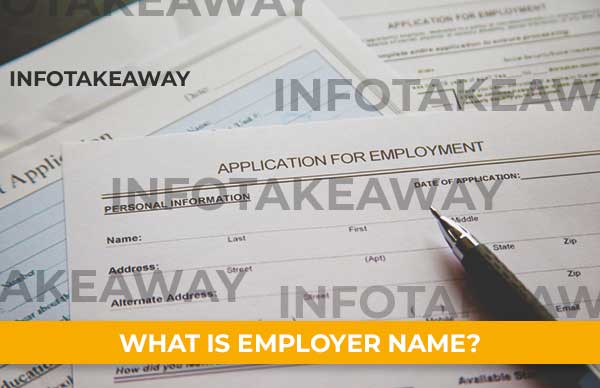Let’s be honest, we all hate job-hunting. Employer name is a type of information that really irks me as it is very vague to fill out on a job application.
Filling out information for a job application can be confusing, even more so when we are asked to fill out random information that has no connection to the job we are applying for.
During my job search adventure, I’ve encountered the term “employer name” numerous times. This term is very vague and people normally don’t understand how to answer it. Is the interviewer asking the name of my boss? Or are they asking something else?
Employer name on a job application means that you are to write the name of your last employer. You need to put the name of the legal entity, that is the company that employed you, not the name of your supervisor or your boss.
In this article, we’ll explain and everything about the phrase “employer name” so you can rest easy and ace every job interview in existence.

Meaning Of Employer Name
No matter which company or place you go to apply for a job, you’ll most certainly encounter the term “employer name” just like other terms as job title or document title, etc…
Don’t stress too much about it as it is a very simple question. All you have to do is put the name of your previous or current employer.
Note that you should put the name of the company that you worked or are working for, not the name of your boss. There are cases where the person who employed you previously, didn’t have a proper company and they just hired you to help them.
In such cases, it is completely fine to put the name of your previous boss, but keep in mind that these are only specific scenarios. Most of the time, your previous employer will be a company, and that you should put the name of the legal entity.
Here’s an example. Say, you previously worked for a company called XYZ, and now you are looking for a new job. When your interviewer asks you to state your employer name, you should tell them the legal entity name of your previous company which is XYZ, not the name of your boss, for example, Bob.
You Can Sue For Employer Name In California
You might be thinking that the phrase “employer name” is not much of a big deal but in the terms of laws, it is indeed quite a big deal, especially in California. Note that it is not a problem on the employee part, rather on the employer part.
In California, there’s a law in the California Labor Code, specifically the code 226, that states that the employer name is the registered name of the legal entity that you work for.
For example, suppose your company doesn’t mention on the salary slip their name, you can sue them. A person did just that. The person in question belonged to Countrywide Payroll & HR Solutions.
This company mentioned the company CSSG on the salary slip and payroll of the person as the employer name. The person in question sued the company over this incorrect employer name. Employer of record got sued just for not mentioning employer identification. The fake employer can be sued if they are not genuine.
You can see where this is going right? Therefore, always be sure of the employer name and all the laws associated with it so you or your employer don’t get in any disputes.
How To Answer Employer Name On Job Application

Now that we’ve discussed what the term “employer name” means, let’s move on to how to answer it whenever someone asks you during an interview or on a job application.
When you go to an interview or you apply for a job online and the other party asks for your employer name, simply give the name of the company that was your previous employer.
If your interviewer asks you to fill out the employer name of all of your jobs, this means that you should give them the name of all the companies that you previously worked for.
How To Answer Employer Name On First Job
If this is your first time applying to a job, then the employer name can be a bit tricky. In the first place, your interviewer will not ask for your employer name if they know that this is your first job. However, if you are applying to a job that requires experience but you don’t have any, then it is simply wise to enter “No employer” in the “employer name” section.
How To Answer Employer Name If You Are Self Employed
If you ran a business or worked freelance, but are now looking for a job then you can get confused about “employer name” if you see it on a job application. Even more so if this is your first time applying to work for someone else.
If you previously ran a business, you can simply enter the name of the business as your employer name on the job application and during the interview, you can explain it to the interviewer.
You can also put details like the day of employment, employment locations, etc.
When Not To Answer Employer Name

Well, it’s right to speak the truth but in some cases, you have to speak a little bit, not complete. What do we mean by this is that sometimes when you are telling about your employer name, a bad experience might happen with you there.
Like, if you had a dispute with your boss in the previous company, they fired you without a reason or with a reason. They were not professional etc. there are many reasons when you know you are right but can’t speak out the truth just for the sake of yourself.
Because the employer will be the employer, he will not think about you. He will first make a picture that if this guy is fired from a previous employer, there might be something fishy about him or her. So always remember, if you were fired, don’t say your employer name.
Sometimes, your boss’s attitude is not good for you. Instead of being a leader, he is just bossing around and torturing you mentally. You took a resign just because of your employer’s attitude. It’s good, always keep yourself calm and in peace first.
Sometimes, your previous employer’s review matters a lot, in case the previous said that you did not perform your full business days in the company. Or he said that your legal entity is not valid, it creates problems for your new job.
But if you are trying to hunt a new job and a new employer interviewing you and ask the question regarding your previous employer, don’t spit it out. For your own sake, don’t spit it out!
Tips For A Better Interview

The current employer where you are going to give your interview might ask you difficult questions. So always prepare yourself before coming on to the table.
Before an interview, study the company and its profile. It will help you to explain the agenda and description of their job. Moreover, while introducing yourself, remember to explain the core key points relevant to the job.
Always give interest in your employer’s details like the employer address, if the employer request for address/name change? The employer work dates or search for employers before they ask you to search it.
The application form contains many things like payroll records, resumes to entities, etc. The employers by industry title also check s the payroll agent as well as the entire payroll database.
Always prepare yourself for weird questions. It is possible that the employer asks questions out of the job description. So in a situation like this, always trust yourself and answer the most positive question. For example, if they are asking you why did you lose your first job?
Answer it in a positive way rather than saying that your boss was not good. You should always have good body language while giving an interview. It is the best card for employees. In this, you can also get high colors in explaining the job title.
Not All Employers Will Ask For Employer Name
It is true that employers whom your going to work in the future will ask you for your employer name but some will not ask it. Not all fingers are equal, as do the employers. Some employers believe that a person should have knowledge of how to work in an organization. The ideas, work ethics, office decorum, etc. it matters to them rather than previous salary, etc.
Some employers think that if a person is experienced and knows how to work in a professional environment, he or she is good to go. Because they can teach the person how to do a task more easily than how to do a formal business meeting. Let’s take an example. IT Graduate John knows how to work in JavaScript.
He has learned all the basics as well as advanced and making web applications on freelancing. He applies for the job of Jr. Web Developer. The employer in the interview will ask first for the technical details to see if John is the right person for this job.
If John makes his way through all the skills that an employer is seeking, The employer will not ask John about his Employer Name. It’s because the Employer knows that John knows his thing and he is the perfect candidate for this job.
Instead of reviewing labor certifications or option ideal verification, hire him for work.
Conclusion – Employer Name
Employer name means the name of your previous company where you were working. It simply means the name of your previous employer. The reason to ask is to know what you’ve done there and how are you beneficial for their company.
The employer name is sometimes confused with your team lead or manager’s name. Keep in mind that it means the name of your previous organization. Does the current employer see where you working in the competitor’s company? If so, how are you beneficial?
Employer name gives you a chance of promotion in the new company. Sometimes it is for the link update within an organization to check whether the employee is best for this promotion or not. STEM extension, STEM extension OTP, mention all the pieces of training you have done while giving an interview.
The employee for wages, do so many audits. The audit file of an international student. They also do the calculation of student for checking their overnight files etc.
Ask questions in the comment section if you like our article. Go check out other articles “Does vaseline expire?“, “chiclet teeth“, and “Can You Put Cardboard In The Oven?“.